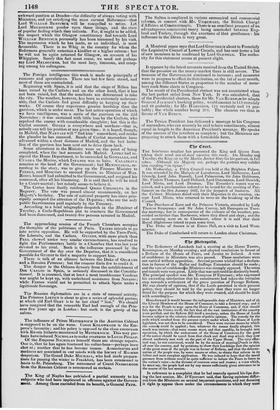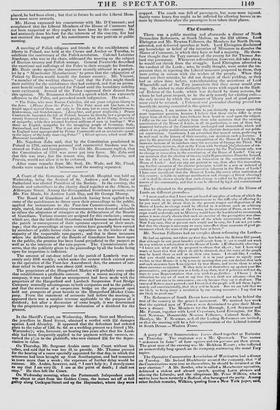Ebr Otetropotto.
The Reformers of Lambeth had a meeting at the Horns Tavern, Kennington, on Monday evening; and adopted resolutions in favour of a Reform of the House of Peers, and Justice to Ireland. A vote of confidence in Ministers was also passed. These resolutions were not carried without opposition. Several persons wished that a declara- tion in favour of the Ballot and Suffrage Extension should be made ; and the vote of confidencelin Ministers was strongly opposed. The noise and tumult were very great. Little that was said could be distinctly heard. The principal speaker was Mr. Tennyson D'Eyncourt ; who expressed his exceeding satisfaction that his constituents had taken the initiative step towards a settlement of the grave question of Peerage Reform. He was clearly of opinion, that if the Lords persisted in their present policy, they should be told by the people that they were no longer fitted for the purpose for which they were created, and should be dealt with accordingly— '
Henceforward it would become the indispensable duty of Ministers, and of all the Liberal Members of the House of Commons, to take a forward step; and it was for the People to urge upon the House of Commons, and, if that should fail, upon the Crown itself, the fact that all the vast institutions of the country were perilled, and the Reform Bill itself a mockery, unless the House of Lords became subject to the salutary influence of public opinion. The remedy for the evils which resulted from the present system under which the House of Lords legislated, was not then to be considered. There were various means by which the remedy could be applied ; but, whatever the means finally adopted, this much was certain—that some means must, and that speedily, be brought into operation, by which the endeavours of the House of Commons for the good of the nation should be saved from that check and dead stop which they now almost uniformly met with on the part of the Upper House. The very effec- tual way, he was convinced, would be by the means of meeting;,'such as this, all over the country, and by petitions, to show their Lordships that the opinion of the great mass of the people was in favour of Reform, and that the determi- nation of the people was, by some means or other, to obtain that reform in its fullest and most complete application. He was induced to hope that the moral pressure from without would be quite sufficient to induce the Peers to listen to the nation's voice—to the dictates of common sense and reason; a voice which, lie must say, the people had not by any means sufficiently given utterance to in the course of the last session.
In reference to a complaint that he had scarcely opened his lips dur- ing the last session, Mr. D'Eyncourt said, that having opinions differ- ent from the Ministers on several important questions, and not deeming it right to oppose them under the circumstances in which they were
placed, he had been silent ; but that in future he and the Liberal Mem- bers must move onwards.
Mr. Hawes expressed his concurrence with Mr. D'Eyneourt ; and complained that the Liberal Members of the House of Commons had not been supported as they ought to have been by the country. He had anxiously done his beet for the interests of the courtry, but had Not received the support of his constituents by one petition or public meeting.



























 Previous page
Previous page